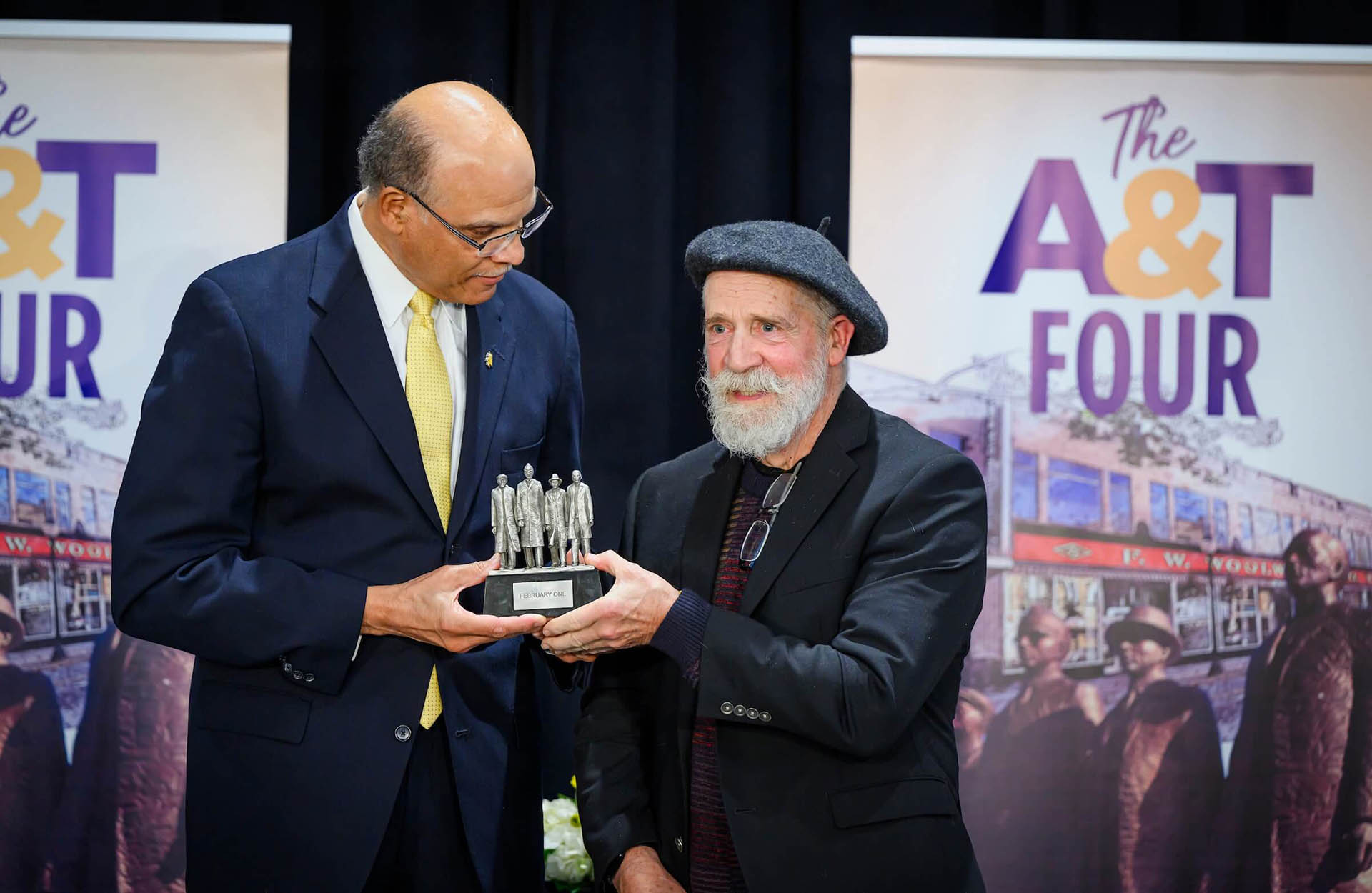
Chancellor Martin ‘Side by Side’ Episode Debuts on PBS
02/10/2026
By Jackie Torok & Jamie Crockett / 02/01/2024 Student Affairs, Alumni
EAST GREENSBORO, N.C. (Feb. 1, 2024) – A single dignified and defiant act by four North Carolina Agricultural and Technical State University freshmen exactly 64 years ago served as one of the most important catalysts for the Civil Rights Movement.
Standing up for equality by sitting down at Woolworth’s whites-only lunch counter in downtown Greensboro, the A&T Four inspired similar peaceful protests across the United States in a unified rejection of racial injustice.
N.C. A&T remembered the courage of Jibreel Khazan (formerly Ezell Blair Jr.), Joseph McNeil, the late Franklin McCain Sr. and the late David Richmond with its annual community celebration, “The Gathering: Strength in Our Unity.”
 The event featured a tribute to James Barnhill, Ph.D., a retired assistant professor of art at A&T and acclaimed sculptor whose February One Monument – installed in 2002 – is the most photographed landmark on the university’s 132-year-old campus.
The event featured a tribute to James Barnhill, Ph.D., a retired assistant professor of art at A&T and acclaimed sculptor whose February One Monument – installed in 2002 – is the most photographed landmark on the university’s 132-year-old campus.
“The statue’s location in front of A&T’s Dudley Memorial Building further emphasizes its significance within the university’s history,” Chancellor Harold L. Martin Sr. said before presenting an honorary award, a replica of the monument, to Barnhill. “The monument’s depiction of the four young men walking out of Woolworth’s after their protest is not only a powerful visual representation but a testament to the transformative impact of their actions.”
The event also saw Martin present the Human Rights Medal, the university’s highest honor for contributions to civil rights, civil liberties and/or human rights. This year’s recipient is Naeema Muhammad, senior advisor for the North Carolina Environmental Justice Network and founding member of Black Workers for Justice in North Carolina.
In the former role, Muhammad worked on two National Institute of Environmental Health Sciences-funded grants, including the Community Health and Environmental Reawakening, where she collaborated on waste issues from industrial hog operations. She has also been involved in the Community Health Effects of Industrial Hog Operations project, serving as a community organizer, environmental justice educator and participant in qualitative data analysis.
Local and state dignitaries joined A&T Four family members, faculty, staff, alumni, current A&T students – including February One Scholars – and students from the A&T Four Middle College at A&T, Bennett College and Dudley High School for breakfast, the presentations and a panel discussion, “The Gathering Conversation.” Students from Bennett, Dudley and the University of North Carolina-Greensboro joined in the 1960 sit-in movement until Woolworth’s guaranteed equal access to all of its lunch counters.
After rousing performances by the award-winning N.C. A&T Fellowship Gospel Choir, the panel featured Crystal W. Boyce ’07, ’15, interim associate vice chancellor for Alumni Relations; Kennedy Lighty, a senior majoring in political science; Tiffany Seawright, director of Leadership and Engagement; and Oliver M. Thomas ’06, Ph.D., M.Div., director of External Affairs, who spoke about the preservation of democracy in the context of the A&T Four legacy.
“As a student, it lays a groundwork in all that we do. It serves as motivation and inspiration to keep going,” said Lighty. “I think it’s important that everyone gets involved.”
“Our students have protested, stood against injustices, advocating against gerrymandering. It’s important for Aggies as alumni to know our history as well as our students,” said Boyce. “Understand issues as they exist now. Go into the archives and learn the strategies that they had in the 1960s. Our students stood then, and they still stand today. Our students sat then, so students today can stand.”
“We should also make sure that we are not being performative. That it’s genuine and real, and bring folks to the table who want change, and not just talk about it, but have action behind change,” said Seawight. “If they’re not ready to take action, and we’re just going to keep on having conversations, then what’s the point of the gathering?
“Democracy requires participation. Anti-intellectualism is plaguing our democracy right now,” said Thomas. “You have to read, engage in conversation, know what’s happening in your community.”
“Having a gathering like this reinvigorates our hope to know that we’re doing this together.”
With another stirring N.C. A&T Fellowship Gospel Choir performance, the laying of memorial wreaths for McCain, who died in January 2014, and Richmond, who died in December 1990, at the February One Monument concluded the celebration, which was followed by a student social justice discussion at Harrison Auditorium.
Media Contact Information: Jackie Torok